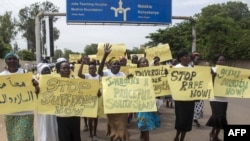Female lawyers in South Sudan are speaking out to say they face discrimination on a daily basis, and a female judge says the same holds true for judges as well as for many other women with professional careers in the country.
Judge Martha Jobe Jeremiah told South Sudan in Focus that society perpetuates the belief that women are the weaker sex, which impacts professional working women.
“The society setup really affects us in a sense that is not only affecting the female advocates or the female lawyers in general but also affecting women in different professions. As much as women at home are now the head of household, some are the ones taking care of their children in absence of their husbands, yet society still looks at them as a weak element or weak person in society,” Jeremiah said.
While some South Sudanese hold on to patriarchal thinking, not all do. Jeremiah said that unless there is a change in that mindset, women will continue to face discrimination.
There are about 40 female judges across the country, Jeremiah said, adding that most face the same challenges as female lawyers, because some defendants do not want their case heard by a female judge.
Josephine Michael, a lawyer and advocate for her female colleagues, said most South Sudanese still believe male lawyers are better at handling, and winning, court cases than their female counterparts.
“There are fewer female lawyers in the market than males while there are female law graduates, but citizens always prefer the person who takes charge of their case to be a man, believing that a female does not have strength of advocacy, but a male does, so they always go to men thinking a male lawyer can solve their problem faster and better than a woman," Michael told South Sudan in Focus.
She said female lawyers and advocates need financial support to help them establish female-headed law firms across the country.
On the way toward achieving that goal, she encourages her colleagues not to get discouraged even though they face a slew of logistical problems.
“Female lawyers do not have offices or law firms; you find all law offices in Juba are for male lawyers. The number of female lawyers in this country is approximately 400 lawyers and those who have offices can be counted by the number of fingers,” Michael told VOA.
“We are five in our office, and I am the only female lawyer. Unfortunately, my desk was at the doorway and anyone entering the office thinks I'm a secretary, because they presume the work of secretary is the job of women and so a female cannot be a lawyer,” Michael said.
Suhila Deng, chairperson of the South Sudan Female Lawyers Association, said much more must be done to promote women in all professional fields in the country.
Years ago, Deng said a group of women lawyers established the female lawyers association to help provide legal aid to the most vulnerable and to also encourage one another in their careers.
“In the year 2012, we managed to establish a female lawyers association to look into the issues of female lawyers in the country. By then there were only four offices of women advocates in the markets and the rest are males’ offices. Lack of money or resources is among the things I explained,” Deng told South Sudan in Focus.




